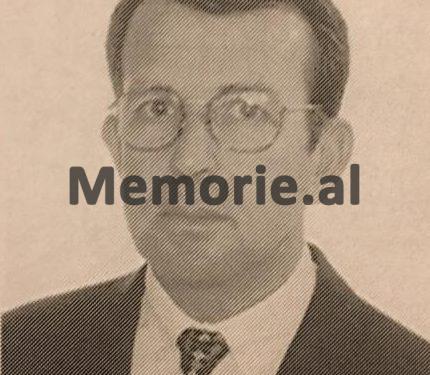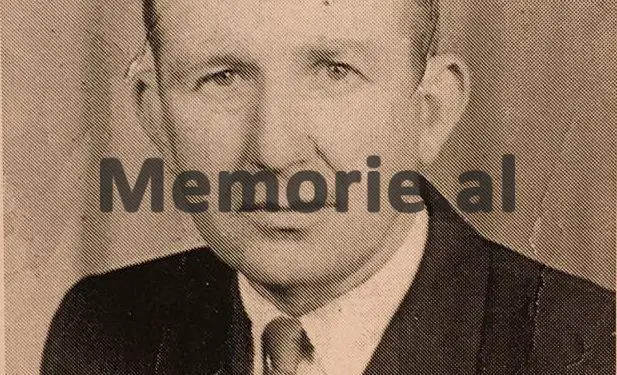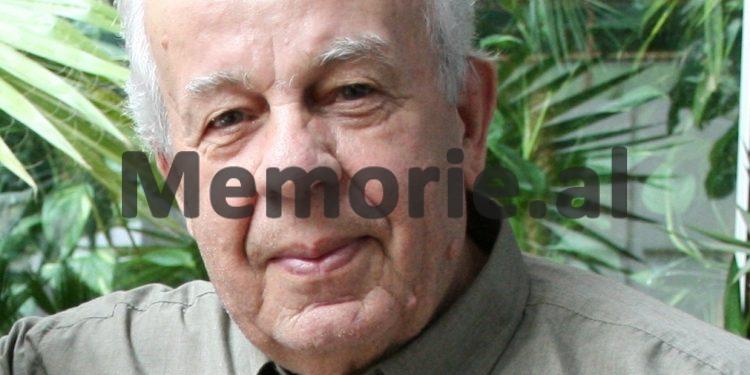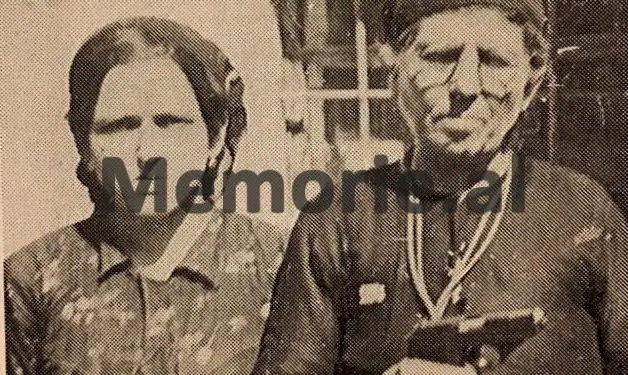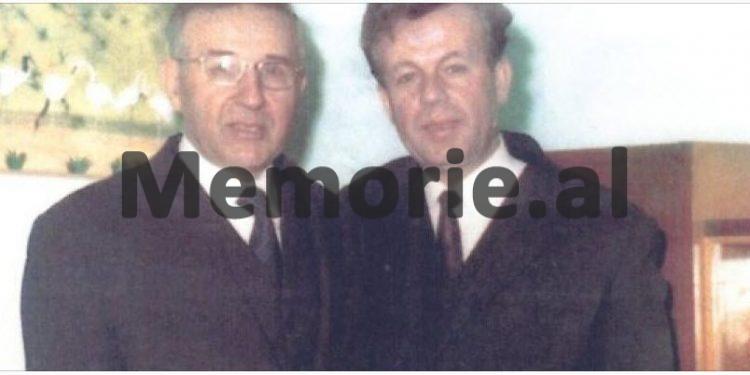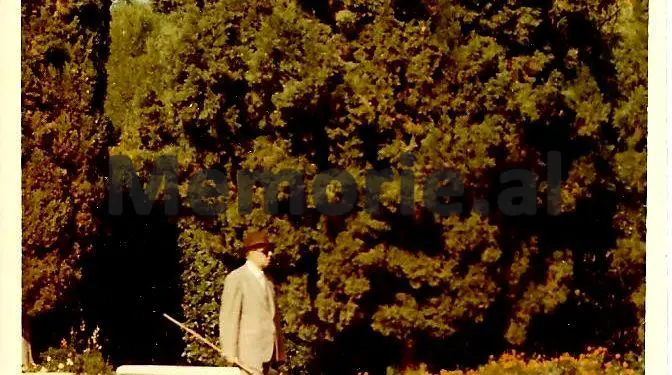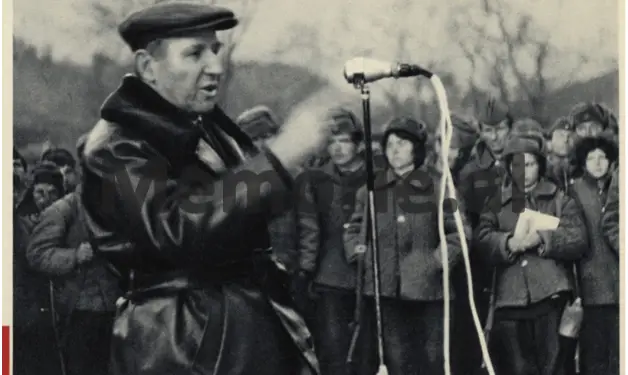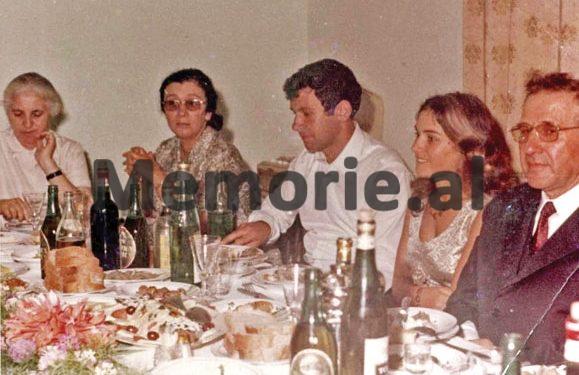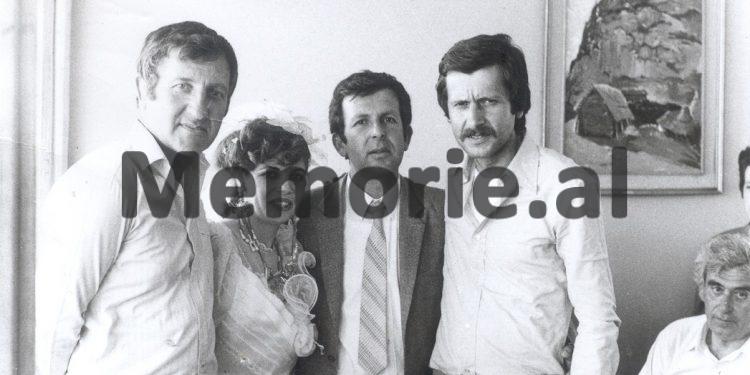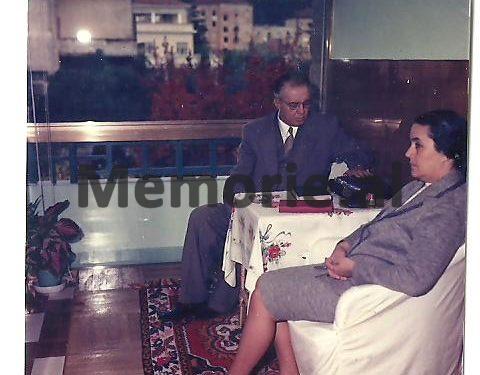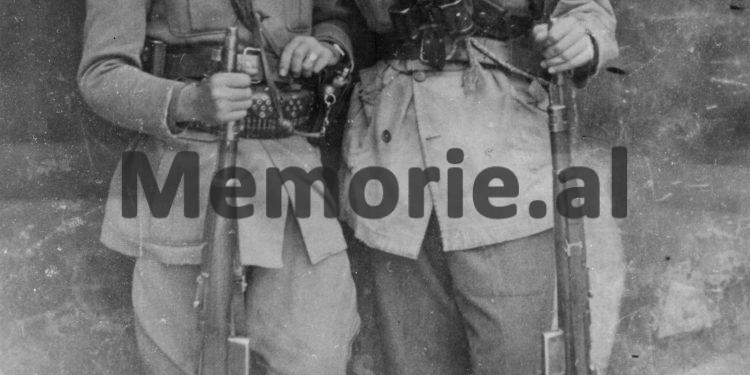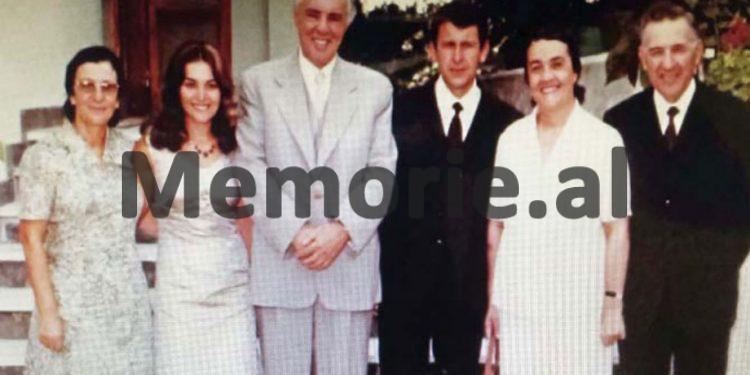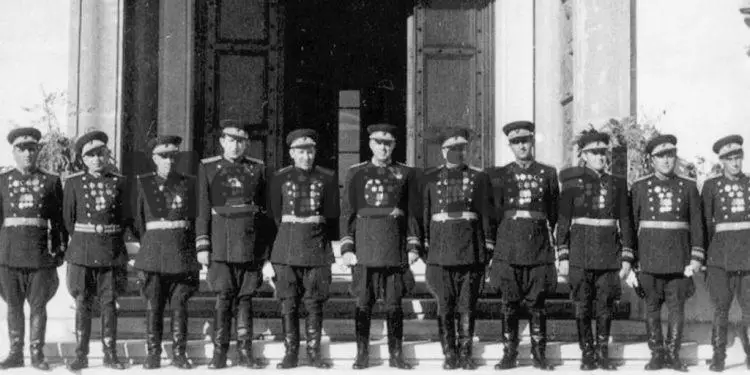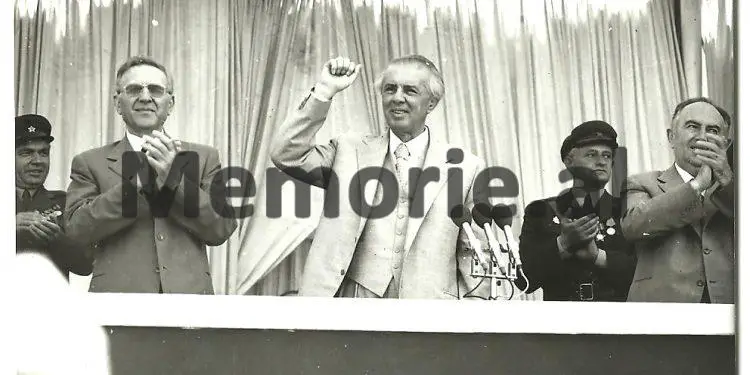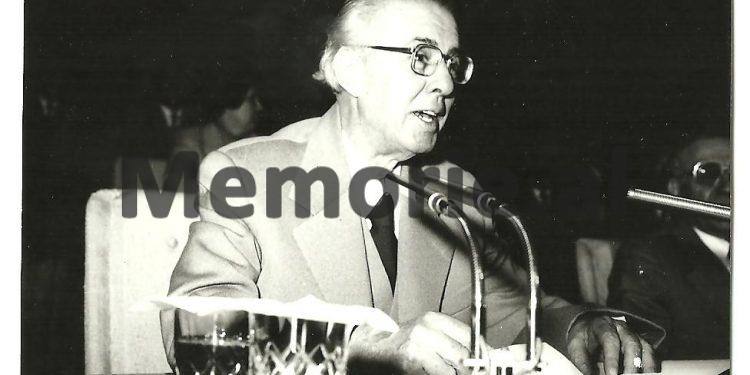Dashnor Kaloçi
Memorie.al publishes the unknown story of the family of the former Albanian Prime Minister, Mehmet Shehu, from the period of the Zog Monarchy and during the years of the occupation of Albania, when after his return from exile in France, he and his whole family joined the Anti-Fascist Movement, standing in the mountains until the end of the War. The horrific event of 1944, when Mehmet’s brother Arshiu, in order not to be discovered by German forces passing by with a convoy, threw his six-month-old daughter, who was crying incessantly, into the abyss. All these and other events come exclusively for Memorie.al from the interview with Kujtim Shehu, the son of the brother of the former Albanian Prime Minister, Mehmet Shehu, who tells some of the most talked-about stories of their family, such as the murder of the Italian officer that Mehmeti had a schoolmate in Modena and had stayed at his house and the wrong treatment his son, Bashkim Shehu, had given him that event in his book, “Autumn of Anxiety.” Mehmet’s relations with Koci Xoxa and the attempts to arrest him in 1947, when he was forced to hide in his village, Çorush, the strained relations with Enver, Skender’s engagement to Silva Turdi and how she was received by his brothers?! How did they learn in Fier the news of Mehmet’s death, their arrival in Tirana, and staying near the funeral home at his uncle’s villa in Bllok, which was surrounded by guards with machine guns! The funeral of Prime Minister Shehu the next day only with family members under the strict surveillance of State Security people, as well as the inhumane treatment that was subsequently carried out against their family, which led to the suicide of the brother-in-law who was thrown from the fifth floor to Fier, until the physical elimination of Mehmet’s brother, Arshiu, Kujtim’s father, who was found dead at the Mbrostar Bridge in Fier, etc.
“On the morning of December 18, 1981, like any other ordinary day, I was at work near the Petroleum Vehicle Park in Fier, where I worked as a mechanical engineer and did not know anything about what had happened in Tirana with our uncle, Mehmet. , the Prime Minister of Albania. On the afternoon of that day, the other uncle, Durua, had called from Tirana to our house and told my father, Arshi, to leave urgently for Tirana at his brother Mehmeti’s house. During that brief telephone conversation, Durua had not told his father at all what had happened to their brother but had hung up the phone, telling him that: that order to go urgently to Tirana had been given by Enver Hoxha himself. After that, my father called me and we both went out and went to the Chairman of the Committee, Ligor Çifligu, who was very willing, giving us his car to come to Tirana. When we arrived in the capital, around six o’clock in the evening, we did not go directly to my uncle’s villa in Bllok, but to the house of my sister, Shqiponja, who had grown up and had been married to Mehmet’s house. There we learned about what had happened, as our brother-in-law, Pirro Stefani, who worked as Director of Foreign Affairs at the Ministry of Foreign Affairs, told us that they had gathered at an emergency meeting at the Ministry and communicated the news to them, telling them that: Mehmet The sheik had killed himself and with that gesture, he was an enemy of the Party. A few minutes later, we heard that in the official announcement of the Central Committee that was broadcast by the Albanian Radio-Television, in the news edition of 20:00, after which a show with folk music was given! After that official news, my father, Arshiu, and I set off in the direction of Mehmet’s villa in Bllok, and along the way from “December 21” to the checkpoint at the entrance of the Central Committee, several officers from behind followed us. Security-clad civilians, whom I knew as faces. There at the Bloc, security measures were increased as seldom ever, and in addition to numerous officers, soldiers carrying light machine guns were also dubbed. At the checkpoint, without much delay, we were allowed to enter, as I told the officer that I was Mehmet’s nephew and my father was his brother.
The man who speaks and testifies for the first time exclusively for Memorie.al, is Kujtim Shehu, the grandson of former Albanian Prime Minister Mehmet Shehu, who tells the whole unknown story of his uncle’s family and the relationship they had with Enver Hoxha. One of the most sensational and rare testimonies that the son of the brother of the former prime minister of Enver Hoxha’s communist regime made public for the first time, is what happened in the Shehu family villa and around it, from the evening. of December 18, 1981, and until the day after Mehmet’s burial, in the public cemetery of Sharra. From the description of all those moments that happened minute by minute in the villa where the former prime minister’s lifeless body was, his nephew, Kujtim Shehu, sheds light on many of the enigmas and mysteries that have covered that unusual event of it happened that distant winter night in the “Block” where the highest leaders of the communist leadership of the Albanian state lived. But what was the Shehu family like, what relationship did Mehmet build with his parents, brothers and close family members, and how did they flow and develop, from the time of the War until the last day of his life? What was Enver Hoxha’s first meeting with the Shehu family and why did Mehmeti have a heated debate with his father, Sheh Ismaili, about the words he had said to “Usta Hasani” as he was known by the pseudonym Enver at the time? How did Mehmeti escape without being physically eliminated in 1947, when he was fired from the position of Chief of Staff, and who were the people who protected him for two months in a row, staying with a machine gun in his house in Çorush? What happened in the Shehu family after the engagement of the second son, Skënder, and how was that engagement received by Mehmet’s brothers? What are the versions given by the nephew of the former Albanian Prime Minister with his testimonies, regarding the death of his uncle, Mehmet, father, Arshi, and Vladimir, what new facts does he bring and why does he insist that the three of them did not commit suicide? , but have been eliminated by the State Security by order from above? Regarding these mysteries and many other facts and events unknown until today from the history of the Shehu family, we know the exclusive interview of Kujtim Shehu for Memorie.al, starting from today’s issue.
Mr. Kujtim, as a start, can you tell us something briefly about yourself and your connections with Mehmet Shehu’s family?
I was born on June 6, 1954, in the city of Fier and I am the only son of Arshi Shehu, who was Mehmet Shehu’s second brother.
How many brothers did Mehmet Shehu have and how many of them did their family consist of?
Mehmet’s father and at the same time my grandfather, his name was Ismail, and during the period of the Zog Monarchy, he served as Sheh of the Tekke of the village of Çorush in Mallakastra, where the origin of our family is from. While Mehmet’s mother and at the same time my grandmother, was called Sultana and she was originally from the Alikaj family in the village of Shkoza in Sevaster, Vlora, a village which is not far from Çorush. Sheh Ismaili and Sultana had four sons, the eldest of whom was Mehmeti, who was born in 1913, followed by my father, Arshiu (1918), the third is Duro and the fourth, Nexhipi. Until 1942, when Mehmeti returned from France, the family of Sheh Ismaili lived in the village of Çorush, being a large patriarchal family consisting of more than 30 people. As my father told me, in addition to Sheh Ismaili, Sultana also had a great influence on her four sons. She was a very wise woman who read a lot and in the time of Turkey, Teqja e Çorushit, she was raided twice by the Turkish authorities because she kept Albanian books and primers there.
What did that family do, and how did they provide for themselves?
Sheh Ismaili’s family, which was a family of religious descent, was in a good economic condition, thanks to the properties and assets she had inherited from her ancestors.
How long has the Shehu family lived in the village of Çorush?
As early as the autumn of 1942, when Mehmeti became fully involved with the Anti-Fascist National Liberation Movement, the Shehu family was forced to move from there, as he was constantly pursued by Gendarmerie forces and the Italian occupying authorities. So from that time until the end of the war, Sheh Ismaili’s family has been constantly in the mountains, moving to the First Operational Zone: Vlora-Gjirokastra-Përmet-Tepelena and Mallakastra. In all those movements, my father, Arshiu, was in charge of providing for the family, as Mehmeti was engaged in the War.
One of Mehmet’s closest associates testified that during the war, one of Mehmet’s brothers threw his living child into the abyss ?!
Unfortunately, this is more than true and he was my father, Arshiu. That happened sometime in the summer of 1944 when the Germans launched Operation June against partisan forces. At the time, the entire Shehu family was housed in a cave on Mount Golik, where a partisan hospital was located. At that time my father, Arshiu, and my mother, Semini, had with them their six-month-old daughter (my sister), whose name was Liri. She cried incessantly and from her cries, she was in danger of being dug into the cave where the partisan hospital was, as below and above it, was passing a German convoy, which we’re looking for partisan forces. Arshiu had orders cut by Mehmeti that: their family should never fall alive into the hands of the enemy and in the last moments, he should kill everyone with his own hand and in the end, himself. To save all the wounded partisans and also the Shehu family, my father, Arshiu, threw my six-month-old sister, who was also the first child, into the abyss.
How did you experience that moment, what do you know more about this once unheard of event ?!
It is a terrible event, but this is the reality that happened in our family at that time. At that moment, the father grabbed his head and immediately grabbed a machine gun and tried to kill himself, but at the last moment, Sheh Ismaili removed it from his hand.
Bashkim Shehu, your uncle’s son, in his book “Autumn of Anxiety”, has dealt with one of the events of the war period, where his father, Mehmeti, executed an Italian slave, whom he had a friend and stayed at home. his in Italy, when both were attending military school. I want to connect this with the event of the loss of life of your little sister that you just told us. So, has the harshness of the Shehu family brothers been in the genes ?!
That event is not as Union has described in his book, and I have debated it with him.
But how does the truth stand about that event?
Mehmeti not only did not order the execution of the Italian officer who had had a schoolmate in Italy but on the contrary, he entrusted his father, Sheh Ismaili, telling him bluntly: “Something happened to the Italian, he (Sheh Ismaili) will answer with his head. ”However, when Mehmeti came and found the Italian killed, from the order given by another man, the one who could not touch his father, from the nerves, fell on the wall with his head. and that wound had remained open for a long time.
How do you know this event?
I know this from my father, Arshiu, but my two uncles, Duro and Nexhipi, can also testify to that very well, as they were present when that event took place.
Mehmet Shehu is also accused of the shooting incident of 67 Ballists prisoners in 1943 in a village of Myzeqe?
Even that accusation was made by Enver Hoxha only after the physical elimination of Mehmet. The execution of the Ballista prisoners was ordered by Dushan Mugosha and Mehmeti, and there was a heated debate with him until late at night. Present at that debate was one of the former leading cadres of the First Assault Brigade, who later became a major general and lived until recently in Tirana. He must have had the civil courage to make that event public, as it happened in the relay and not silent, as he did after the 1990s, shutting his mouth. Mehmeti, indeed, could have been harsh in nature, but he could never have done what happened, that is, the execution of 67 Ballista prisoners, as it is a fact that only two days ago, he captured another Ballista gang. and set them free to flee to their homes, after disarming them. For what I am telling you there are still living witnesses and archival documents as well.
Where did the end of the war find the Shehu family?
Immediately after the end of the war, the entire Shehu family moved to Tirana, apparently living in the villa of the former prime minister, Koço Kota. At that time, Mehmet took all his brothers there, while Duron with Nexhip, arranged them and started studying them in the Soviet Union.
What do you know about the blow that Mehmet suffered in 1947 when he was dismissed from the post of Chief of Staff of the Army?
According to what my father, Arshiu, told me, Mehmeti called him at that time and told him to go to Çorush and open the house, as he was in danger of being physically eliminated.
From whom was Mehmet endangered?
It is understood by Enver Hoxha, no one else at that time, and then could not order the elimination of Mehmet. This is well known and has been acknowledged by Koci Xoxe in his trial, that he, Koci, had done everything at the behest of the Commander, as Enver was called.
What happened to Mehmet at that time, did he go to Çorush?
A few days later, Mehmeti also left Tirana and went to Çorush, where he stayed for almost two months, locked up at home. During that time, my father, Arshiu, was standing next to him, guarding him with a machine gun in his hand, so that no one would come to arrest him. After the signals from his loyal people, some Security officers who had been sent from Tirana to supervise Mehmet and his whole house, who were entering and who was leaving, were eavesdropping around. Likewise, Mehmet had some loyal people around him who guarded the area around the house on a remote perimeter, signaling it to anyone who could approach the house. As my father told me, once those Security officers approached the house so close that when they told Mehmet, blood rushed to his head and he came out threatening them: if they did not leave immediately, they would be killed. threw brains in the wind. After that case, they left, but without removing the surveillance from the house, they just left somewhat further away.
What happened next?
Two months after that event, my father, Arshi, was mobilized as a soldier in Gjirokastra, which was done so that he would not be near his brother because legally, his father did not have to go to the army because he was old and he had also been in the partisan ranks. In those days when he was a soldier in Gjirokastra, near the command of that military unit, a radiogram arrived from Tirana, demanding his execution, but the radio operator informed him to leave urgently before he handed over the radiogram to his superiors. So the father fled from Gjirokastra, traveling on foot to the mountains until he reached the village of Çorush.
How long did those conflicts between Mehmet and the senior leadership in Tirana continue, that is, with Enver Hoxha?
Those meetings continued for some time, where Enver and Mehmet clashed several times at Politburo meetings, so much so that the Soviet ambassador intervened to settle those disputes, things that are already known from many archival documents.
When did Mehmet return to Tirana?
After a two- to a three-month stay in the village of Çorush, where he was constantly under tight security surveillance, Mehmeti left and came back to Tirana, where he was later politically rehabilitated.
Did your father come to Tirana with his family?
After Mehmet’s arrival in Tirana, my father, Arshiu, continued to stay in the village of Çorush, along with my mother and sisters who were later born. Shortly afterward, he and his family moved to the Liberation Farm on the outskirts of Fier, where he worked as a mechanic after completing a tractor course. In 1951, my father moved there and came to Fier, settling as a tenant in a private house, where we stayed as a family until 1968, and only then did we enter the palace. Even in the city of Fier, the father worked as a mechanic until 1965 and since he was ill with migraine, after that year, he worked as a storekeeper in the Municipal Enterprise of Fier, until he retired in 1978.
Did your father feel bad working as a mechanic and storekeeper, at a time when his brother was prime minister and could help him with a better job?
It is true that there have been many cases when different people have told their father that: why he worked as a mechanic when his brother was prime minister and he replied that: his brother was prime minister of all Albanians and not only him. Arshiu, not only did not have a problem with that job at all, but several times rejected the offers made to him to introduce him as an enterprise director, telling them that there were other young and more capable cadres who could go to those places. The father was a very honest man with a strong character and did not accept any kind of privilege that could be given to him from the position of his brother, Mehmet. Without exaggerating and leaving aside modesty, for the sake of truth, I want to say that with that spirit he has raised and educated us, six children. Precisely because of this, Mehmeti appreciated Arshi even more, with whom when he came to our house in Fier, he consulted, asking him about various problems that the village and the city had because he knew that Arshiu was only telling the truth. , whatever it was.
Did Mehmeti often come to your family in Fier?
Since he was very busy, he rarely came, I can say once in three or four years. But whenever he had holiday occasions or birthday anniversaries, he would send his car to Fier to pick up Arshi.
What about Mehmet’s other two brothers, Durua and Nexhipi?
Durua, after studying in military schools in the Soviet Union, returned in 1959 and served as an officer in the United School and then in the War Aviation Command, where he was arrested in 1982. Nexhipi also graduated from a military school in the Union. Soviet, he served for some time at the Pashaliman base in Kuçova, and after being released from the army, he worked in Elbasan, as a deputy director in a commercial enterprise. Then he worked in the Vehicle Utilization Branch in Durrës and in 1981, after Mehmet’s event, he was sent to Kavaja where he retired.
But with his uncles, what kind of relationship did Mehmeti have?
Mehmeti had many weaknesses for the family of his uncles, the Alikajs, who were of Bejler descent, owned land, and properties in Vlora and Myzeqe. He owed much to them, since when he was very young he kept in constant contact with them, often going to their house, which had a very rich library, which greatly influenced his later formation. Mehmet found an opportunity and went to the village to meet Gani because the others died early. After the establishment of cooperatives, Gani was declared a kulak, and the Front was left without a Triska. After being devastated by the economic situation, he wrote a letter to Mehmet, telling him that he was suffering even for a living. After that, Mehmeti went to the village and told the leaders of the cooperative: “As an hour, you have left the prime minister’s uncle in this condition, so that there is no bread to eat. Wouldn’t you be able to get him to join the cooperative? After that, he withdrew Gani to Tirana, hiring him as a hotelier. Mehmeti also took care of Gani’s children’s education.
What about the other Mallakastriots who had no blood or friendship with Mehmet, did they go to him for the problems they had?
Since Mehmeti was too busy, the people of Mallakastriot or even the close people of our tribe, for any problem they had, went to our grandmother, Sultana. She was a woman of strong character and the only one who had an absolute influence on her son, Mehmet. When she died in 1972, Mehmet ordered that the doors be opened to anyone who wished to come for comfort and that no one, no matter who he was, is prevented. On that occasion, many people came for comfort, even people who had just been released from political prison. Enver Hoxha and the entire Politburo also attended her funeral. After the death of the Sultan, her place as viceroy was taken over by Fiqretja, to whom we addressed whenever we had troubles and problems. She took it upon herself and did much not only for our tribe but also for the other Mallakastriots. We constantly had all our hopes in Fiqretja.
When Skender got engaged in the fall of 1981, did you go as a family to congratulate him?
We learned of Skënder’s engagement from Mehmeti, who called his father, Arshi, and he congratulated him on the phone, but also from our sister, Shqiponja, who had grown up and was married to Mehmet’s house in Tirana. At that time Arshiu was ill with migraine and could not come to Tirana for congratulations, but I came with my fiancée, as I was engaged a short time before Neli, and as usual, I took the bride to introduce her to her uncle’s family. , and I also wished Nell’s engagement. When we went there, both Mehmeti and Fiqretja were very happy about that engagement, because they had a weak point, Nelin. Mehmet looked like he was young that day.
When you went to congratulate, did you find any of the top leadership there?
When we went and how long we stayed there, no one came, but when we were going out with Fiqret who was following us, we met Ramiz Alia and his wife, who were coming there for congratulations.
How did you learn to break off the engagement and did you know anything about the contradictions or coldness that had begun between Enver and Mehmet?
We learned to break up the engagement through the information we had from our close people in Tirana, but also from the words that began to spread everywhere.
Didn’t Mehmeti say anything to your father, Arshi?
No, he didn’t say anything, those conversations couldn’t take place on the phone. But still, the father felt that something great was happening to his brother, and he was constantly under constant stress. One week before Mehmet’s death, on December 11, 1981, he woke up at night and came to my room, where after turning on the light, he touched my body so that I would have nothing. At that moment I calmed him down and he fell asleep again, but the next day, he told me that he had seen a dream as if I had been massacred with knives and terrified he came to see me if I had blood on my body. That came to him after he constantly had his mind on Mehmet after he had learned of the conflicts that had opened up with Enver.
How did you learn about Mehmet’s death and who informed you about it?
On the morning of December 18, 1981, like any other ordinary day, I was at work near the Petroleum Vehicle Park in Fier, where I worked as a mechanical engineer and knew nothing about what had happened in Tirana with our uncle, the Prime Minister. of Albania. On the afternoon of that day, the other uncle, Durua, had called from Tirana to our house and told my father, Arshi, to leave urgently for Tirana at his brother Mehmeti’s house. During that brief telephone conversation, Durua had not told his father at all what had happened to their brother but had closed his speech, telling him that the order to go urgently to Tirana had been given by Enver himself. Hoxha. After that, my father called me and we both went out and went to the Chairman of the Committee, Ligor Çifligu, who was very willing to give us his car to come to Tirana.
When did you come to Tirana and where did you first go?
We arrived in Tirana at six o’clock in the evening and went straight to our sister’s house, Shqiponjës. There we learned about what had happened, as our brother-in-law, Pirro Stefani, who worked as the director of the Ministry of Foreign Affairs, told us that they had urgently gathered at the Ministry and communicated the news to them, saying: “Mehmet Shehu had killed himself and with that gesture, he was an enemy of the Party.” A few minutes later, we heard the official announcement of the Central Committee that was broadcast by the Albanian Radio-Television in the news edition of 20:00, after which a musical show was given.
Did you go to Mehmet’s villa that night?
After what our brother-in-law told us and the official news, my father, Arshiu, and I immediately went outside and headed for Mehmet’s villa in Bllok. At that moment, torrential rain fell, and all the way from “December 21” to the checkpoint at the entrance of the Central Committee, we were followed by several security officers dressed in civilian clothes, whom I knew well as faces.
What did you notice when you went there, how was the situation around Bllok?
Security measures were rarely added to the Bloc, as they were rarely, and in addition to the numerous officers seen everywhere, the soldiers carrying light machine guns were also dubbed. At the checkpoint, without much delay, we were allowed to enter as I told the officer that I was Mehmet’s nephew and my father was his brother./Memorie.al
Follows tomorrow




